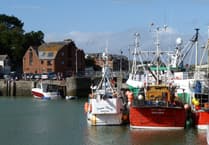WEST Penwith has become a shining example of how wildlife can flourish when people and nature work together - with a record number of fluffy barn owl chicks leading the way.
While barn owl numbers have struggled in many parts of Cornwall this year due to a dry early spring affecting prey availability, the story in West Penwith is far more hopeful.
Working closely with the West Cornwall Ringing Group, National Trust rangers have recorded 21 barn owl chicks fledging this season - the highest number in Cornwall.
This success is the result of a landscape-scale effort. Local farmers are installing owl boxes in barns to create safe nesting spaces, while also nurturing hay meadows that support healthy populations of voles - the perfect prey for hungry owlets.
“Barn owls are a great indicator species - when they’re thriving, it’s a sign the wider ecosystem is healthy too,” says Shaun Boyns, ranger in the West Cornwall countryside team.
“This year’s results build on a quiet but steady success story in West Penwith, where thoughtful land management is making a real difference. We work closely with farmers and the Cornwall Ringing Group - an approach that shows what’s possible when farming and conservation go hand in hand.”
Barn owls aren’t the only ones benefitting. It’s also been a bumper year for bats, especially at Godolphin, where nine species have been recorded. Careful habitat management, healthy hay meadows and connected woodland provide the perfect environment for insects to thrive - a vital food source for bats - and create the sheltered spaces they need to feed, navigate and roost.
Birds, too, are making a comeback. Across West Cornwall, 80 per cent of surveyed sites showed an increase in bird species, with Godolphin again emerging as a top performer thanks to its rich mosaic of woodland, heathland and organic farmland.
These results reflect a bigger story: land managed with wildlife in mind creates more resilient, biodiverse landscapes that benefit both people and nature.
Through countryside stewardship schemes, conservation partnerships and close collaboration with local farmers, the National Trust is working to secure a brighter future for Cornwall’s wildlife - and these fluffy barn owlets are just the beginning.





Comments
This article has no comments yet. Be the first to leave a comment.